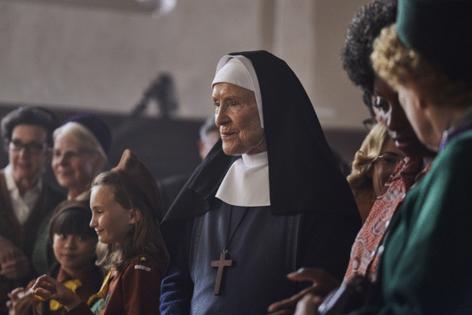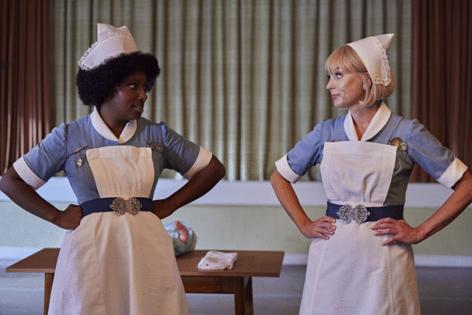Commentary: 'Call the Midwife' on PBS is a gentle reminder of love in a turbulent world
Published in Entertainment News
Public service announcement: If you are planning to binge a few episodes in a row of “Call the Midwife,” the long-running BBC series about a group of nurse midwives in midcentury working-class London, don’t forget to hydrate. There’s something uncanny about how this lovely show works on the tear ducts, perhaps due to the beautifully weathered voice of Vanessa Redgrave as the narrator, or the unerringly adorable army of infants employed in every episode, or the way nearly every character seems to embody loving kindness. The show dances on the edge of sentimentality but rarely falls into it; though grittier than “All Creatures Great and Small,” another PBS favorite, it has a similar sense of gentleness.
“Call the Midwife,” whose 14th season began streaming last month on PBS (it will appear on Netflix later this year, where all previous seasons also reside), is inspired by the memoirs of Jennifer Worth, a nurse midwife who wrote several books about her years working with a community of nuns in the eastern London district of Poplar. The first three seasons center on Worth, here called Jenny Lee and played by Jessica Raine, and her early years living at the Nonnatus House convent and working in the community in the late 1950s. After Raine departed the show, an assortment of characters have come and gone, but a few have remained throughout the entire run: Sister Julienne (Jenny Agutter), the experienced midwife who runs Nonnatus House; Sister Monica Joan (Judy Parfitt), an elderly retired nurse; senior midwife Trixie Aylward (Helen George); Shelagh Turner (Laura Main), a nurse who runs the local maternity clinic with her husband Dr. Patrick Turner (Stephen McGann); and Fred Buckle (Cliff Parisi), an amiable local shopkeeper who helps out at Nonnatus House.
Over the years — it’s now 1970 in Poplar, and the Beatles have just broken up — the show has depicted hundreds of births, covered every imaginable obstetric complication and taught many of us a few basic truths for home delivery. (I do feel that, after 14 seasons, I might be helpful in an emergency birth, though I’m still not quite sure what they’re doing with all that boiled water.) But it’s also, in its gentle way, touched upon numerous other social and cultural topics: immigration, poverty, racism, disability, religion, birth defects, abortion, workers’ rights — and, in every episode, the vast range of love. We watched Shelagh, originally a nun, struggle with her vows and with her growing love for Patrick (with whom she now shares four children); we watched two female nurses fall in love with each other, in a time when such a love could not easily be spoken; we watched as Fred, in late middle age, married fellow shopkeeper Violet (Annabelle Apsion), with whom he’s still besotted. “Can’t a man just sit in quiet admiration of his wife?” he asks in a recent episode, gazing at Violet as if the sun rose on her formidably pouffed ’60s hair.
When a show lasts for as many seasons as “Call the Midwife,” you watch it with memories of characters long gone. I particularly miss “Chummy” (real name: Camilla Fortescue-Cholmondeley-Browne, played by Miranda Hart), a posh yet clumsy young midwife in the earlier seasons who had a delightfully self-deprecating wit — and whose travails at learning how to ride a bike provided some of the show’s funniest moments. (The nurse midwives traverse Poplar by bike, with habits or uniform capes streaming behind them.) And, as with any show that goes on for so long, there are occasional stumbles in quality: Sister Monica Joan, for example, has what I’ll call TV dementia (i.e., she’s confused when it’s useful to the plot, and perfectly lucid when it’s not), and a few plotlines seem to have been revisited more than once.
But at this point, the show’s as comforting as a gathering of a group of friends, and a celebration of people who are wonderfully good at their jobs. These days in particular, I find enormous pleasure in the velvet of Agutter’s soft yet steely voice; in how ultra-efficient surgery secretary Miss Higgins (Georgie Glen) always has a hat on (and, as we learned recently, has her own secrets); in the lovely presence of Daniel Laurie, an actor with Down syndrome who imbues Fred and Violet’s adopted son Reggie with such kindness; and in the way Redgrave’s voice provides a beautifully engraved picture frame for every episode. “Love is the chain that links us,” she murmurs softly at the end of a recent episode, “the armor that shields us, the arrow that pieces the heavens and sets us free.” Excuse me while I go get a glass of water.
———
“Call the Midwife”
The first five episodes of Season 14 are streaming on PBS, with additional episodes dropping Sundays through May 11. All previous seasons are on PBS and on Netflix (which will air Season 14 later this year).
———
©2025 The Seattle Times. Visit seattletimes.com. Distributed by Tribune Content Agency, LLC.
















Comments